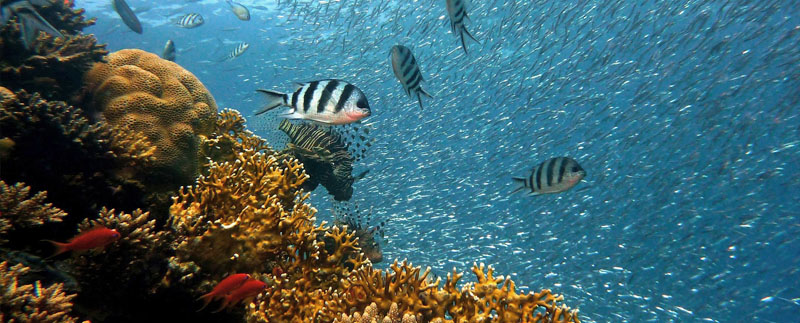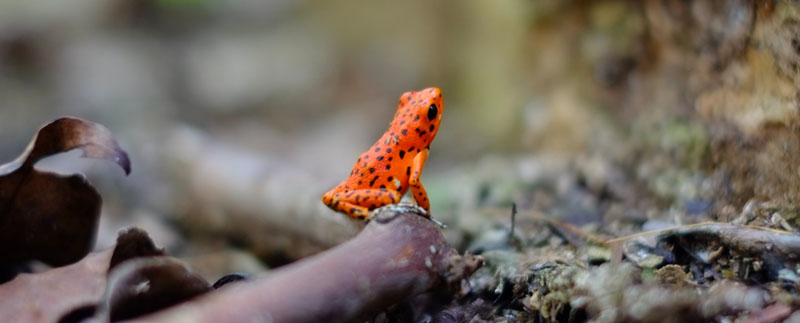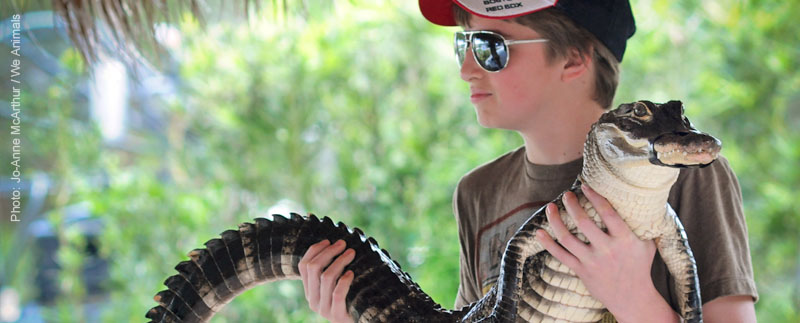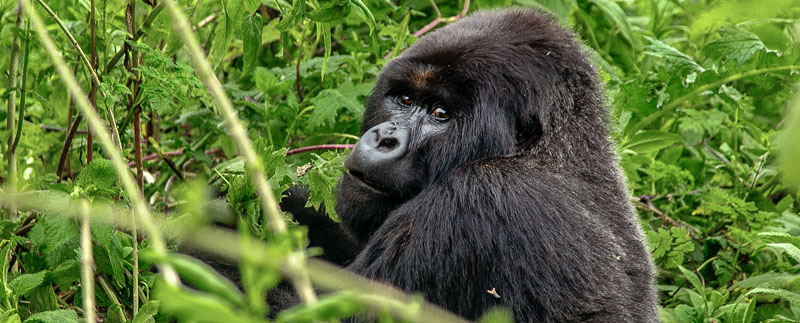Tag: climate change
ANIMONDIAL declares a climate emergency

There is no doubt, Planet Earth is experiencing the highest atmospheric CO2 concentrations that have not been equalled for millions of years, with resulting temperature rises threatening the balance of life and the collapse of everything that gives us security.
…
ANIMONDIAL, the specialist consultancy supporting the travel and tourism businesses to better protect animals and nature, acknowledges the Climate Emergency, and offers a means for the tourism sector to embrace the “silver bullet” to lessen climate change and save ourselves.
This requires much more than just counting and reducing carbon output, it requires the better protection and regeneration of the natural systems that already absorb carbon and bring stability to life on Earth.
Professor Schellnhuber, Director Emeritus at Potsdam Institute for Climate Impact Research, speaking at ITB Berlin earlier this month, acknowledged that nature is our “silver bullet” to combating climate change. He acknowledged nature’s ability to absorb carbon and maintain ecological balance, advocating a complete change in global priority-setting, whereby animal and nature protection underpins all human activity.
Whilst tourism can exploit nature, wildlife, and the limited natural resources, if managed well, it brings value and investment to animal and nature protection, and ecosystem services. Tourism can be a force for good and through cross-sector effort, tourism could become the driver for meaningful change. ANIMONDIAL helps guide travel and tourism businesses to make the right choices to Build Back Better for Animals and nature.
Humans and domesticated animals now account for 95% of all biomass on Earth, with wild mammals, birds, reptiles, and amphibians being about 5% (Bar-On et al., 2018; Elhacham et al., 2020). Human activity has already altered over 70% of the Earth’s land surface (IPBES, 2019) and more than two-thirds of the oceans (Halpern et al., 2015) through the loss of biodiversity and habitat degradation (IPBES, 2019). This has already resulted in an average 68% decline in population sizes of vertebrate species (WWF, 2020) and 1 in 5 recorded animal and plant species facing extinction (IUCN, 2020). Humanity is already consuming 1.6 times more resource than the Earth can naturally provide (Global Footprint Network), and if nothing is done to lessen the impact, nature’s ability to prevent atmospheric CO2 overload and spiralling global warming, will be severely compromised (C. Bradshaw et al., 2021).
Scientists, NGOs and governments have been telling us for years that humanity must seek to better manage its impact. Various global initiatives have tried to bring structure and interpretation to the required efforts (UN Sustainable Development Goals, the Aichi Targets, the Triple Bottom Line, etc.) but as acknowledged by Anna Pollock during ATTA’s AdventureELEVATE Virtual Europe, these have all failed to achieve their goals – crippled by a lack of commitment, collaborative action, an overabundance of targets and a lack of sector practicability. Later this year, CoP15 on biological diversity, and CoP26 on climate change, may well set more targets, which could well fail, but perhaps we should instead focus on priorities rather than trying to address every challenge at once?
Whilst it is easy to become overwhelmed and disillusioned by the mounting evidence of the Climate Emergency, there is hope. Hope that through our concerted efforts, we can lessen negative impact, better protect and regenerate nature, and improve the Earth’s ability to retain ecological balance. Businesses, not only governments, must step-up and adopt sustainable practices that better protect the life on which we depend.
ANIMONDIAL does not claim to have all the answers, but it does have the vision and the drive to work with others, combine knowledge and efforts, to simplify complexity and overcome challenges, and the ability to deliver meaningful change. In the months and years ahead, ANIMONDIAL will do what it can to connect, inform, inspire, and empower sustainable and regenerative tourism that prioritises the better protection of animals and nature – but we cannot do this alone.
What can you do?
Reconnect with nature
As a part of nature ourselves, we must provide opportunity for travellers to reconnect, understand, appreciate and respect nature as our lifeline for wellbeing and prosperity.
Safeguard individual welfare
Ensuring all animals involved in holiday or vacation offerings / excursions have a life worth living. Where a respect for life on Earth starts with recognising and safeguarding their individual and species-specific needs.
Overcome industry challenges
Alternative to ‘stop sale’, work with your partners and suppliers to develop responsible alternative experiences to those activities with animals evidenced to compromise animal welfare and survival.
Protect threatened species
Underpinning biological diversity, efforts must seek to prevent the killing, wild-capture, trade and sale of animal and plant species threatened with extinction, and to better protect endemic fauna and flora.
Invest in nature
Bring much needed support and value to community-based animal protection and nature conservation, encouraging local people to value wildlife and natural habitat alive, not dead.
Together we can Build Back Better for Animals, where nature-friendly tourism is part of the solution to lessen the global problem of climate change.
…
» Learn more about ANIMONDIAL’s Build Back Better for Animals! Sign up to the initiative and received information and exclusive offers on trainings and services.
REFERENCES
- Bar-On, Y. M., Phillips, R., and Milo, R. (2018). The biomass distribution on Earth. Proc. Natl. Acad. Sci. U.S.A. 115:6506–6511. doi: 10.1073/pnas.1711842115
- Bradshaw CJA, Ehrlich PR, Beattie A, Ceballos G, Crist E, Diamond J, Dirzo R, Ehrlich AH, Harte J, Harte ME, Pyke G, Raven PH, Ripple WJ, Saltré F, Turnbull C, Wackernagel M and Blumstein DT (2021) Underestimating the Challenges of Avoiding a Ghastly Future. Front. Conserv. Sci. 1:615419. doi: 10.3389/fcosc.2020.615419
- Elhacham, E., Ben-Uri, L., Grozovski, J., Bar-On, Y. M., and Milo, R. (2020). Global human-made mass exceeds all living biomass. Nature 588, 442–444. doi: 10.1038/s41586-020-3010-5
- Global Footprint Network (2021)
- IPBES (2019). Global Assessment Report on Biodiversity and Ecosystem Services. Paris: IPBES Secretariat.
- WWF (2020). Living Planet Report 2020. Gland: WWF.

Save ‘Life Below Water’

This year, there are two important international events to galvanise efforts to address the deepening crises of biodiversity loss and climatic change.
…
The Convention of Biological Diversity in China in May will seek to secure commitments to halt biodiversity-loss, whilst the UN Climate Change Conference in Glasgow in November, will aim to further the Paris Agreement goals and reduce carbon emissions.
These will both require cross-government commitment but, it will be their resulting actions that will be assessed for years to come, as to whether enough was done to avert these crises and reach a ‘new stable state’.
Sir David Attenborough gave an impassioned speech to the UN Security Council this week. He urged the assembly of nations for their immediate collaborative action to avert the global “collapse of everything that gives us security”, to work together to lessen climate change, and “to value nature… beyond money”. He recounted the rising global temperatures, current atmospheric CO2 concentrations “that have not been equalled, for millions of years”, the despoiling of oceans, and the catastrophic decline of biodiversity as the contributing factors. Above all, he recognised the need for every one of us to do what we can to lessen the resulting disasters ahead.
We, of course, expect our governments to step-up, listen to Sir David and other experts, and take the immediate, necessary action but, what can we do as businesses, and as individuals?
I know many of us are currently focused on our own survival during this current COVID-19 crisis, but it is also an ideal time for the travel and tourism business to review its pre-pandemic activity: identify negative impact, and seek to better manage, or ideally minimise it. I believe that actions must now be more than just ‘reduce, reuse, and recycle’, in fact we should adopt a multifaceted approach that seeks to address the key drivers of climate change: carbon emissions, over-exploitation of natural resources, and biodiversity loss.
Animal protection may not be the priority for most travel businesses, but recognising its impact on climatic change, perhaps it should be…
I co-founded ANIMONDIAL to help the travel and tourism sector work through the complexities of animal and nature protection in tourism and identify which actions can be taken to minimise negative impact and restore the health of the natural environment. It is certainly vital to ensure your product offerings are aligned to your animal protection commitment but why not also think about how you can restore biodiversity in the destinations you visit. ANIMONDIAL’s Build Back Better for Animals initiative is offering webinars, trainings and services to inform, inspire and empower travel and tourism professionals. Providing all that you need to assess impact, and review and improve current practices.
For example, consider what you can do to better protect our oceans and seas.
These cover 70% of Earth’s surface and within them live tiny plant-like organisms, known as phytoplankton. Just like plants and trees they contain chlorophyll that capture sunlight and use photosynthesis to convert it to energy, producing oxygen as a by-product. Phytoplankton are as equally important as rainforests and woodlands and produce over 50% of the world’s oxygen and absorbs 50 x more carbon dioxide than our atmosphere (World Economic Forum, 2019). They also support all life within seas and oceans, including approximately 16% of all animal protein consumed globally and the livelihoods of 40 million people (OECD, 2016).
Damage to these fragile environments, through pollution (plastic, chemical, fertilisers, etc), overfishing and trawling, damping of waste, etc., kills the phytoplankton, realising stored carbon, and removes that life support. Not only does this exacerbate global warming, but also threatens to change our climate and weather patterns. According to the US National Oceanic and Atmospheric Administration “more than 90% of the warming that has occurred on Earth over the past 50 years has happened within the ocean”.
The point I wish to make is that whilst it is important to focus on carbon emission reduction, such as converting to green energies and cutting out single-use plastics, it is equally, if not more important to protect and regenerate the life on Earth that already exists. From ‘Life Under the Water’ (SDG14) to ‘Life on Land’ (SDG15). A mature tree holds over 100 times more carbon, and life support, that a newly planted sampling; placing more importance to preserving primary forests than planting more trees.
By adopting measures to better protect animals (biodiversity) and nature (life support), we have a chance to lessen the crises that Sir David had said are inevitable if ‘we’ continue on ‘our’ current path.
Each month I aim to focus on different natural environments and mention projects that are doing great work to better protect that environment. Offering travel businesses the opportunity to learn about their work, I hope travel businesses will support their activities and fulfil their SDG obligations. This month, acknowledging the start of the UN Decade of Ocean Science for Sustainable Development – a framework to support the sustainable management of the oceans – I have focused on actions to save ‘Life Below Water’ SDG14 – “to conserve and sustainably use the oceans, seas and marine resources for sustainable development”. The following are all members of ANIMONDIAL’s Animal Protection Network:
Save the Aegean
Save the Aegean is an initiative of the Archipelagos Institute of Marine Conservation that aims to form an alliance between environmentalists, scientists, businesses, and consumers to reduce the environmental footprint on this popular sea.
Save the Aegean aims to contribute to the protection and preservation of the Aegean Sea’s rare biodiversity, through filling in knowledge gaps via research and awareness raising through effective conservation actions and eco-tourism.
Aegean Marine Life Sanctuary (AMLS)
The Aegean Marine Life Sanctuary aims to become the world’s first sanctuary for dolphins, displaced from zoo attractions, and provide rescue and rehabilitation of sick, injured or ‘at-risk’ marine animals. Serving as a model of a multi-disciplinary teaching facility, AMLS will focus on providing solutions-based initiatives to better protect marine mammals and turtles through a ‘unified’ Mediterranean Marine Mammal Rescue Network.
Barbados Environmental Conservation Trust (BECT)
The Barbados Environmental Conservation Trust (BECT) has been set up to enable and support local communities and environmental activities aimed at the preservation and restoration of Barbados’ natural assets including the conservation of its marine life. Supported projects include the protection of marine life, particular turtles, and the regeneration of its coral reefs. Efforts seek to restore the country’s marine biodiversity, protect its beaches from erosion, and boost the attractiveness of the habitats for ecotourism.
CCell
A UK-based organisation, CCell was founded to solve the one of the of most devastating effects of climate change: The degradation of the world’s coral reefs and coastal erosion. CCell provides a cost-effective, long-term and sustainable solution by utilising energy from renewable sources to generate rock at a rate grown 2-3 times faster than in nature.
Corals grown in hatcheries are planted onto the rock creating a reef benefitting the environment and providing comprehensive coastal protection. Their pilot project in Mexico is underway and in collaboration with the local community and international artists, they now wish to develop an underwater attraction to appeal to the eco-tourism market and extend the protected marine zone. The project aims to improve knowledge and encourage cross-community support creating a site of marine restoration, environmental education and cultural appreciation.
Please get in touch if you would like to be introduced to one of these exciting projects that are protecting Life Below Water.
…
» More about ANIMONDIAL’s Animal Protection Network
» Sir David Attenborough’s speech to the United Nations Security Council (February 2021)

Build Back Better: can sustainable tourism regenerate nature?

Now that the disastrous year of 2020 is behind us, we can all look forward with new hope. Hope that the road to recovery is short lived, hope that tourism will once again support opportunity and development, but also the hope that the threat of further pandemics will be averted, and the fallout never happens again.
…
We now know that COVID-19 is an animal-borne disease, or zoonotic disease, its passage to humans eased when nature’s natural barrier has been eroded or removed. The World Health Organisation estimates these kinds of diseases account for 75% of all newly detected human pathogens over the last 30 years. Disease, and potential pandemics, which could be averted if biodiversity loss is halted and nature’s health restored.
This is a stark reminder that habitat degradation, animal exploitation, biodiversity loss and climate change are not someone else’s issue but actually affect us all. Facts that certainly help to focus our minds, but ‘not knowing what to do’, or ‘how to do it’, often prevents action, and change.
I co-founded ANIMONDIAL, a specialist consultancy, to help travel businesses cut through the complexity and understand the impacts of their actions on animals and nature, and in so doing, to take responsibility, make informed decisions, and minimise detrimental activity. Protecting animals may not be the first topic that springs to mind when developing your sustainable business strategy, but perhaps it should be…
Not only do we share our planet with 1.8 million+ other species, but their welfare and survival are integral to ours. If poorly managed, tourism tends to exploit animals, degrade their natural attributes, cause habitat and biodiversity loss, and result in climate change, human-wildlife conflict, and viral emergence. However, tourism can be a force for good too, influencing the better protection of the natural environment, its biodiversity, and animal welfare, through tourism revenue and operation. The World Economic Forum estimates nature’s economic value generation at US$44 trillion — that’s over half of the world’s total GDP!
It was therefore shocking to learn that large numbers of animal and plant species are in drastic decline, with monitored populations of mammals, birds, amphibians, reptiles, and fish having reportedly declined by on average by 68%, since 1970 (Living Planet Report, 2020). According to the IUCN, one fifth of the world’s animals and plants are now threatened with extinction. There appears to me no greater need, and reason, to halt biodiversity loss and Build Back Better for animals and nature.
“We are the first generation to know we are destroying our planet and the last that can do anything about it.” — Tanya Steele, Chief executive, WWF
So, as we consider how to Build Back Better during tourism’s resurgence — and we must at this opportune time — it is imperative to follow a more considered approach to sustainability planning and application:
- Acknowledge that environmental, social, and economic impacts are related and interconnected. Consider the fact that a problem may be better addressed at its cause, rather than focusing on the consequence.
- Define your commitment, informing your customers, partners and suppliers, and integrate it throughout the business with defined roles and responsibilities for each team.
- Don’t feel you need to shoulder solution development alone, work with others (experts, partners, suppliers and other travel businesses) to overcome industry challenges.
- Always consider the wider implications of your actions on local people, individual animal welfare, and the natural world, before they are negatively affected.
- Join ANIMONDIAL to Build Back Better for Animals and seek to protect both the animals involved in your product offerings and experiences, and the animals whose welfare may be indirectly compromised within the destinations you visit.
» Sign up to ANIMONDIAL’s Build Back Better for Animals and benefit from exclusive offers and discounted services
In 2021, ANIMONDIAL launched a series of webinars and workshops to inform, inspire and empower travel and tourism businesses to Build Back Better for Animals. » Check out what’s on.
Join ANIMONDIAL, together with other travel experts, for a lively panel discussion at the Adventure Travel Networking Conference on 5th February to consider the implications of Building Back Better. » Find out more

Build Back Better for Animals – Defining your commitment

Year 2020 has been a truly devastating year for the travel and tourism sector, and some may say that it is a completely inappropriate time to encourage business to become more responsible and to better protect animals.
…
However, this pandemic has demonstrated the outcome of overexploitation of natural resources for economic gain, and the deadly consequences of ignoring expert warnings. Whereby the exploitation of nature, its wildlife, and its limited resources, results in biodiversity loss, climate change, and greater potential of viral emergence. During tourism sector resurgence, there is perhaps no greater need to review and reduce our negative impact to ensure our future resilience.
This is also the view of Prue Stone, Head of Sustainability at the UK-based adventure tour specialist, Explore. As with most travel businesses, 2020 has been incredibly challenging but, despite restricted working hours, company management has fully supported her decision to work with ANIMONDIAL, and others, to create Explore’s animal protection commitment.
In the hope that Prue’s experiences can inspire and guide other travel businesses to create their own business’ commitment to better protect animals – I have asked Prue to share her thoughts:
“Developing Explore’s animal protection commitment was both a necessity and a luxury. The need for change is very real, and the time for change is now. However, in such a challenging time, and noting that it takes time to create a suitable policy, and possibly money involved, it is also a luxury. A balance needs to be found.”
ANIMONDIAL advocates the importance for each business to create their own animal protection policy within their wider sustainability commitment. Ever since I started work with the Federation of Tour Operators in 2004, creating animal protection guidance for travel businesses (that formed the groundwork for ABTA’s Animal Welfare Guidelines), I have advised businesses to create their own unique commitment as the first important step. Defining their next steps.
“I think the process of creating a policy from scratch, or even reviewing an existing one, can become a point of reflection, or internal audit. We all assume we are “doing the right thing”, but when was the last time we actively checked? By writing down clear guidelines, providing explanations and examples, and communicating them clearly through the business and supply chain, you are ensuring transparency and greater understanding. Ultimately it will allow us to move towards a better future for animals and wildlife and encourage others to do the same.”
Knowing where to start, and what to include in your policy is a challenge. Particularly with so many issues, external pressures, and the multitude of animal species and activities available – whilst also seeking to protect local livelihoods – How do you start drafting such a policy?
“I started by reading other companies’ policies, in a variety of industries, thinking about how each of these made me feel. I wanted to create something that felt authentic to Explore, which encapsulates how we operate and what we believe in. But there are so many issues to consider, and no one policy will ever be perfect. I take comfort from this. I didn’t need to create a policy that could be scribed in stone, I needed to create one that was right for us now, and acknowledge that it will change over time. And indeed, the changes that we need to make also take time.”
Unfortunately, it is never the case of one approach fits all, and your animal protection commitment should reflect your companies’ brand values and operations, but are there key principles to include that you would recommend to other travel businesses?
“The most important components of any policy are commitment and support, more so than the finer detail. Commitment from the person or team writing the policy, those that make the operational changes as a result, those communicating the policy and those ultimately adhering to the guidelines on the ground. There also has to be support from the top level of management, to allow for the time this process can take and how it will filter through the business’ operations.”
Tour operators are regularly under pressure by well-intentioned activists to remove certain practices with animals or modify operations. How do you manage these pressures around your commercial obligations, or have you just removed the ‘unacceptable’ activities all together?
“It is important to identify any areas of concern or activities which are known to harm animals and to act quickly in the first instance. However I don’t believe removing all activity is the answer to sustainable industry-wide change and a knee-jerk response may also cause greater detriment. Change comes from working together, learning from one another; across cultures, countries, industries. At Explore we know, we alone will not have the impact that is needed to protect all animals, but if we reach out to our peers, our suppliers and our customers and together we all move in the right direction – then we can start to see the changes that are so desperately needed.”
Consulting experts can help improve understanding and navigate the complexities of the topic, as well as help to predict the likely outcomes if certain activities are removed from product offerings. Explore acquired the support of NGOs Four Paws and the Born Free Foundation, as well as the expertise of ANIMONDIAL. How did that work out for you, and would you advise other businesses to work with experts when creating their animal protection commitment?
“The breadth of advice, the different perspectives, and the challenge this all presented was as important as the resulting policy. One size doesn’t fit all, and each partner added something unique. Four Paws, for example, highlighted the need to weave the community element into our policy, whilst ANIMONDIAL offers a board spectrum of knowledge and are specialists within the travel industry. It was the combination of ideals of “perfect” animal protection with the reality of human nature, our own ethos at Explore, and what we want for our holidays and customers resulted that ultimately defined our commitment.”
» Find out more about Explore’s Animal Protection Commitment
ANIMONDIAL also provides additional guidance to help travel businesses mitigate risk, minimise negative impact on nature and biodiversity, reduce the potential for disease transference, procure appropriate animal-based product and Build Back Better for Animals.
The ANIMONDIAL team wishes our blog readers a Merry Christmas and a New Year full of hope and resurgence.


Everyone needs nature, but nature needs us too

Perhaps like me you have spent this month hellbent on listening to, and consuming all that WTM Virtual had to offer in the way of reassurances, advice, and inspiration for future travel and tourism?
…
Unusually for WTM to have the time to listen to the presentations, as well as to take part, has been hugely welcomed. A rare opportunity to hear the sentiments of others, to learn, to connect, and importantly, to think.
“Tourism can be a force for good”, certainly resonates, as well as the urgent call by Ministers “to create a safer, greener and smarter travel and tourism”. I certainly support such sentiments, particular in relation to animal protection and biodiversity regeneration, but whilst an important call to action, there remains difficulty for business to decipher viable actions from such a vision. This is a recurring challenge for travel businesses that want better to protect animals and the natural environment – and why the ANIMONDIAL consultancy was established.
The 2020 Living Planet Index (LPI) presented a stark picture:
- Between 1970 and 2016, there has been an average 68% decline in monitored populations of mammals, birds, amphibians, reptiles, and fish.
- One fifth of the world’s animals and plants – 32,000 species – are threatened with extinction.
- The planet’s biodiversity is in rapid decline, threatening ecosystem viability.
- This threatens our ability to access food and fresh water, medicines and materials, and our capability to combat Climate Change and future viral emergence.
Basically, since 1970, our Ecological Footprint has far exceeded Earth’s rate of regeneration.
There is really no time to waste, we need to act #ForNature.
Encouragingly, I have seen a shift in people’s sense of urgency, and support for action to better protect nature, but there is also a sense of disconnect too that must be addressed.
Perhaps it is so huge an issue that many people feel that action is best left to governments, or it’s the responsibility of big business, or that ending the Covid-19 pandemic has greater importance. These mindsets were considered in the ‘Tourism and Biodiversity, Friend or Foe’ discussion (available at WTM Virtual), which acknowledged the role of business to engage and invest in nature.
The discussion between responsible tourism professionals and conservationists also recognised that Covid-19, biodiversity-loss and the Climate Crisis are inter-related. Failure to protect and regenerate nature will ultimately increase the likelihood of greater environmental challenges, which includes further pandemics. Humanity’s wellbeing, prosperity and survival is therefore dependent on healthy, functioning ecosystems.
Nature is valued and enjoyed by everyone, we must do what we can to protect it.
As tourism businesses, we already know the importance of nature and what it uniquely brings to many destinations across the world. We know travellers are increasingly wanting to include nature in their holidays and ensure measures are taken to minimise negative impact. Tourism can also generate value in nature, influence the protection of key species (such as the Bengal tiger or mountain gorilla) and with tourism revenues, encourage local and national governments to better protect wild spaces and ecosystems.
Tourism, and the thousands of SMEs that underpin the industry, could therefore play a significant role in leading the charge on nature protection and regeneration by:
- Offering greater nature-based tourism product;
- Investing in local communities;
- Working with your suppliers to deliver sustainable activities and solutions;
- Supporting genuine community-based conservation;
- Ensuring only sustainable and responsible activities with animals;
These are obvious and easy steps in the right direction. Although we could do more.
Defining what to do, and how to make a meaningful difference is, however, a complex task. This was a reflection as I completed ANIMONDIAL’s submission to the Business for Nature consultation on the Post-2020 Global Biodiversity Framework. ANIMONDIAL has joined over 600 businesses to urge the world’s governments to set ambitious goals, targets, and policy directions in the lead-up to COP15 on the Convention of Biological Diversity (May 2021). Mobilising multi-sectorial businesses to influence governments to better protect biodiversity is certainly commendable, but it also occurred to me that businesses, particularly in tourism, could further step-up and play a key role. Particularly if those ambiguous visions were translated into relatable and viable actions to optimise output. Whereby overall recommendations to review, reduce and protect are specifically defined for airlines, accommodation-providers and tour operators, for instance. Whilst the SDGs provide important guidance, I would recommend the recruitment of sector and sub-sector champions to help the different businesses optimise on their output.
What is clear is that all businesses, and functions within, irrespective of the sector, must:
- Review their current activities against the SDGs and performance criteria;
- Measure and minimise negative impact;
- Act to better protect and restore nature and its biodiversity.
Check out ANIMONDIAL’s Build Back Better for Animals, supporting the tourism sector.
The other consideration to ponder is should there be ‘a stick’ to encourage those businesses that choose to ignore the urgency, or worse still, proliferate its demise? Justin Francis, WTM panellist and long-term pioneer of responsible tourism, certainly thinks so, he advocates a legal requirement for businesses to ensure biodiversity net gain and penalties for those that do not.
Ultimately everyone needs nature, but nature needs us too.
» Find out more about ANIMONDIAL’s Build Back Better for Animals initiative
» Sign up to ANIMONDIAL’s newsletter for the latest on animal protection news

Time to Build Back Better for Animals

…
ANIMONDIAL’s new initiative to guide and advise the travel and tourism sector to ACT #ForNature.
…
There is no better time, or need, to work together to build a fairer and more resilient society that is kinder to animals and the planet; through clear and achievable objectives and actions.
As the travel and tourism sector focuses on its recovery in what is still a highly challenging time, the UNWTO has called on the industry to “Build Back Better”, and deliver a fairer, more sustainable, and responsible future. Scientists to business leaders have urged industry-drivers and policymakers to ACT #ForNature. Whilst animal protection NGOs advocate an end to wildlife consumption, captive animal exploitation, and intensive food production.
These are all well-intentioned objectives, but my fear is that whilst businesses may support a more sustainable approach, few will enact these recommendations without clearly defined, quantifiable outputs.
Keen to help the travel and tourism sector “Build Back Better”, ANIMONDIAL, the specialist consultancy advocating responsible animal tourism, aims to help businesses Build Back Better for Animals.
Combining its expertise in animal welfare science, sustainable tourism development and social impact, ANIMONDIAL is offering a one-stop-shop of capacity-building and enhancing services to help businesses:
1. Maximise their positive impact
A healthy natural environment is intrinsically linked to the health of natural ecosystems, animals, and people.
If managed well, tourism can influence the better protection of nature and its biodiversity, valuing and investing in nature conservation and ecosystem services, creating jobs, and supporting local livelihoods. However, if poorly managed, tourism tends to exploit nature, its wildlife, and its limited resources, resulting in biodiversity loss, Climate Change, and greater human-wildlife challenges.
As explained in a previous ANIMONDIAL blog, a healthy natural environment is intrinsically linked to the health of natural ecosystems, people, and other animals, as well as vital for tourism productivity.
ANIMONDIAL’s ‘Animal-Friendly HealthCheck’ includes a review of existing animal-based activities, supplier auditing capacity, and advice on product selection and outward facing communications. This provides travel businesses all that is required to better protect animals and the natural environment.
2. Build resilience against public health risk
An incredible 70% of all human diseases discovered in the last 50 years originate from animals.
The World is now conscious to the fact that Covid-19, is a zoonotic disease, of animal origin, that had developed by a coronavirus jumping from animals to humans. However, whilst minimising close contact between people and animals, is an obvious solution, it is not a viable solution, considering animals are a vital resource for our enjoyment, comfort, livelihood, food, health, and survival.
In tourism, interaction with animals and nature is increasingly popular, with up to 60% of holiday activities involving animals (ANIMONDIAL) and 96% of travellers to the Asia Pacific undertaking a wildlife tour (UNWTO 2019); not least the 9 million livelihoods dependent on wildlife tourism.
ANIMONDIAL will help you establish safeguards in your operation and supply chain that will protect both people and animals from zoonotic disease, whilst an expert review of currently practices will identify and mitigate any high-risk activity.
3. Combat illegal wildlife trade
Sustainability can no longer be regarded as an ‘aim to have’, but an integral component of all that we do.
Ending the illegal wildlife trade is essential to protecting global biodiversity and controlling the emergence and spread of zoonotic diseases. Generated and proliferated by huge profits and minimal risk, the unsustainable trade threatens the survival of thousands of ‘endangered’ animal and plant species that are integral to the good health of the natural environment.
Travel businesses should work with their suppliers to ensure they do not sell or promote the sale, or transport of unsustainable wildlife or their products, and ask their customers not to pick up, collect or buy live, or parts of animals or plants.
4. Invest-in-Nature
As a biologist, it is often difficult to review some animal experiences objectively. Particularly when poor practice or negative impact is identified.
However, at a time when travel businesses are under greater scrutiny over the animal activities they sell, it is vital that any such decision is based on accurate and complete animal welfare assessment. This will help to identify any shortfalls against requirement and evidence to substantiate the need for improvements. ANIMONDIAL advocates this approach over the proverbial ‘stop sale’ (when a tour operator no longer sells an attraction), instead opting for constructive engagement, encouraging attraction-providers to make the required improvements. Stopping the sale of an attraction, relinquishes any influence over their activities. So, whilst tourism boycotts may well raise awareness about an issue, from experience they usually do little to address the concerns and can even make matters worse.
ANIMONDIAL offers travel businesses the chance to improve the protection of animals in tourism through working with attraction suppliers and non-profits, supporting carefully selected meaningful courses, and by providing their customers with guaranteed animal-friendly experiences.
5. Build back trust in travel
There is a distinct need for the travel and tourism sector to do more to minimise its impact on animals and the natural world to win back public trust.
Media has reported low public trust in travel, exacerbated by the covid-19 crisis. Animal protection NGOs continually criticised their perceived exploitation of animals in tourism, whilst the industry’s contribution to Climate Change is well documented.
ANIMONDIAL is keen to ensure those tour operators and travel agents, and animal-attraction suppliers, that actively seek to minimise negative impact, are duly recognised and rewarded.
ANIMONDIAL wholeheartedly supports the well-intentioned calls for decisive action by the travel and tourism sector to become more sustainable, resilient, and responsible. However, recognising that it may not be possible for the majority to achieve this on their own, ANIMONDIAL is offering its extensive knowledge and experience in animal welfare and nature protection to build a fairer and more resilient society that is kinder to animals and the planet.
Contact us to find out more about “Build Back Better for Animals”, and why not sign up to our free monthly e-newsletter!

